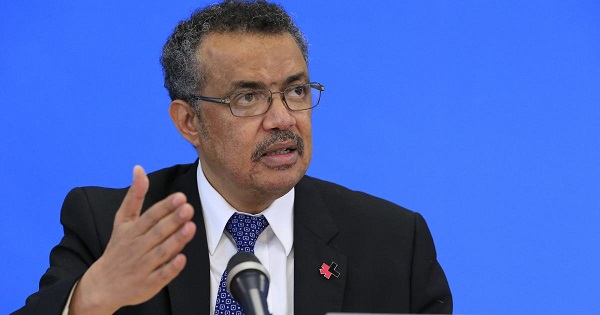
The director-general of the World Health Organisation (WHO), Dr. Tedros Ghebreyesus, has said the global number of COVID-19 cases and deaths was stable last week.
Speaking during a virtual press conference on August 25, he, however, said the indices were stable at a very high level – more than 4.5 million cases and 68 thousand deaths.
“However, the situation is very different from region to region, country to country, province to province and town to town. Some regions and countries continue to see steep increases in cases and deaths, while others are declining.
“As long as this virus is circulating anywhere, it’s a threat everywhere. There are no shortcuts. WHO continues to recommend a comprehensive, risk-based approach of proven public health and social measures, in combination with equitable vaccination,” he said.
The WHO boss pointed out that even as the organization remains focused on ending the pandemic, it is moving forward with plans to understand its origins, saying it recently issued an open call to scientists around the world to apply to the new Scientific Advisory Group for the Origins of Novel Pathogens, or SAGO.
According to him, SAGO will be composed of experts acting in their own capacity, not as representatives of member- states, and will play a vital role in studying the emergence of new pathogens, including the next phase of studies into the origins of SARS-CoV-2.
“I wish to emphasise that SAGO will not delay the progress of the studies into the origins of SARS-CoV-2. The report of the international team published in March outlined a number of studies that can be taken forward without delay. We have encouraged all parties to pursue those studies.
“Even as we continue our work to understand how this pandemic started, we are also moving ahead with plans to strengthen the world’s defences against future epidemics and pandemics,” he stated.
He pointed out that the next three months would be a critical period for shaping the future of pandemic preparedness and response with the UN General Assembly in September, the G20 Summit in October and the special session of the World Health Assembly in November, saying WHO believed that whatever structures and mechanisms emerged must be grounded in several core principles.
“They must have the engagement and ownership of all countries. They must be linked to and aligned with the constitutional mandate of WHO, rather than creating parallel structures which could lead to further fragmentation of the global health architecture…They must involve partners from across the One Health spectrum, including animal and environmental health, civil society and the private sector.
“They must ensure coherence with the International Health Regulations and other international instruments; And they must be accountable.
“WHO is committed to working with all 194 of our member states to build a global system to better protect all people in all countries,” he added.


